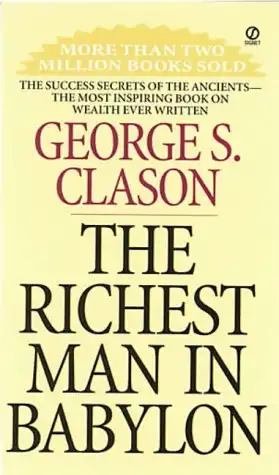As part of the Boost My Budget project I’m reading one personal finance book every month! See my previous reviews here.
This month’s review is The Richest Man In Babylon by George S. Clason.
This book is regarded as an all-time classic of personal finance literature. It was first published in 1926 (!) and remains hugely popular today.
I had been meaning to read this one for a while and had high hopes for it!
The book is a series of short stories set in ancient Babylon – said to be the wealthiest city in the world. The stories are styled as ‘parables’, and all contain lessons about managing money and becoming rich.
Even though the book was written in the 1920s and is set in ancient times (everyone has jobs like spearmakers and cloth weavers, and wealth is discussed in terms of purses of gold pieces), the idea is that the lessons enclosed are timeless. The actual rules of wealth have not changed, and the lessons in this book are just as applicable today as they have been at any point in history.
It’s true that the lessons are timeless. As I started reading, I was surprised how often the lessons were the same as I read in modern personal finance books and blogs, over and over again.
The key lessons include:
- Save at least 10% of what you earn
- Make wise investments
- Take advice from experts
- Plan for your future
- Pay off your debt
… and so on. Nothing groundbreaking here for anyone who already has a basic knowledge of personal finance.
But I can see why this book is so popular, because all the key personal finance rules are here in one short volume. I guess the ancient Babylon/storytelling aspect also makes this book attractive to people who wouldn’t otherwise read a book about money (I’ve heard several people say they were given this as a child or teenager).
However, I did find this book quite repetitive. The book is less than 150 pages long but even still, I found it a slog.
The language doesn’t help. The dialogue is written to reflect that the book is set in ‘ancient times’, and sometimes it’s pretty heavy going.
For example: ‘the golden stream that continually floweth into his purse and keepeth it always bulging […]; an income that continueth to come whether thou work or travel’ – that’s passive income to you and me!
Also, the book is not PC at all. I know people will give it a pass because of its age, but some parts – like the idea of owning slaves as an aspirational symbol of wealth – just don’t sit well with the modern reader.
There are lots of other books, blogs, articles that teach the same lessons in a more modern and accessible way. Maybe this book has had its day?
Boost My Budget rating
3/5
The Richest Man In Babylon is a classic for a reason. If you’re after a good introduction to money management ideas, without wanting to read a ‘personal finance book’, you might enjoy this book. As for me, I’d rather read something more up to date.
Next month’s review is: Broke Millennial: Stop Scraping By and Get Your Financial Life Together by Erin Lowry
Previous reviews:
- Your Money Or Your Life by Vicki Robin and Joe Dominguez
- Rich Dad Poor Dad by Robert T. Kiyosaki
- Millionaire Teacher by Andrew Hallam
- The Millionaire Next Door by Thomas J. Stanley and William D. Danko
- Get Rich, Lucky Bitch! by Denise Duffield-Thomas
- I Will Teach You to Be Rich by Ramit Sethi
My to-read list:
- The Wealthy Barber by David Chilton
- Happy Money: The New Science of Smarter Spending by Elizabeth Dunn and Michael Norton
- The Minimalist Budget: A Practical Guide On How To Save Money, Spend Less And Live More With A Minimalist Lifestyle by Simeon Lindstrom
- Early Retirement Extreme: A Philosophical and Practical Guide to Financial Independence by Jacob Lund Fisker
- The Total Money Makeover: A Proven Plan for Financial Fitness by Dave Ramsey
- The Automatic Millionaire: A Powerful One-Step Plan to Live and Finish Rich by David Bach
- It’s Not About The Money by Brent Kessel
- The Millionaire Mind by Thomas J. Stanley
- A Random Walk Down Wall Street by Burton G. Malkiel
- Rich Bitch by Nicole Lapin
- Money, A Love Story by Kate Northrup
- You Are a Badass at Making Money: Master the Mindset of Wealth: Learn how to save your money with one of the world's most exciting self help authors by Jen Sincero
- Nice Girls Don't Get Rich (Nice Girls Book) by Lois P. Frankel
- The Millionaire Fastlane: Crack the Code to Wealth and Live Rich for a Lifetime! by M.J. DeMarco
Any more recommendations? Let me know!

